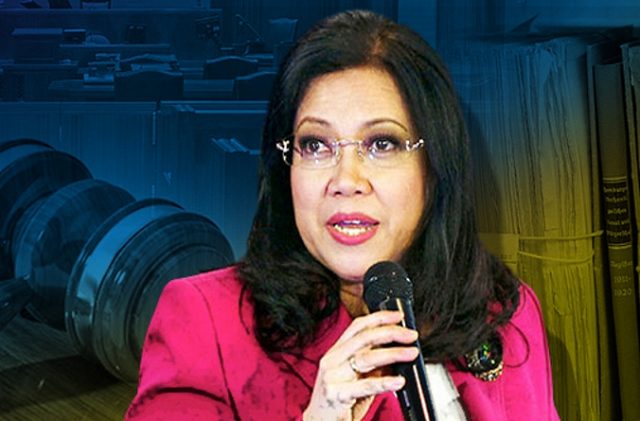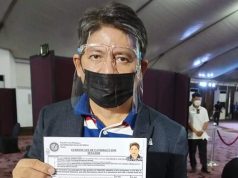MANILA, Philippines – Albay Representative Edcel Lagman on Thursday reiterated his call to allow Supreme Court Chief Justice Maria Lourdes Sereno to be represented by a counsel when the impeachment proceedings against her resumes this month.
In a position paper submitted to the House committee on justice, Lagman said that while an impeachment proceeding is political in nature, “it is imbued with a judicial character akin to a criminal prosecution.”
He cited Section 16 of Rule VII of the Rules of Procedure In Impeachment Proceedings of the House of Representatives, which provides that “The Rules of Criminal Procedure under the Rules of Court, shall, as far as practicable, apply to impeachment proceedings before the House.”
He also mentioned Section 14(2) of Article III of the Constitution on the Bill of Rights, which provides: “In all criminal prosecutions, the accused shall be presumed innocent until the contrary is proved, and shall enjoy the right to be heard by himself and counsel …. to meet witnesses face to face ….”
“Verily, a respondent in an impeachment proceeding, like the respondent or accused in a criminal action, has the constitutional right to retain a counsel of his/her choice. This right to counsel will be rendered nugatory if the respondent’s counsel is denied the opportunity to cross-examine on behalf of the respondent the complainant and his witnesses. The Constitution did not envision a counsel as a useless appendage,” he said.
“Likewise, the right to counsel would be a pathetic farce if the right to cross-examine is limited to the respondent himself/herself only,” he added.
In an earlier hearing, Oriental Mindoro Rep. Reynaldo Umali said Sereno should personally appear at the hearings.
The complaint was filed against Sereno by lawyer Lorenzo Gadon, saying the Chief Justice betrayed public trust, committed culpable violation of the Constitution, and graft and corruption.
Lagman noted paragraph 2 of Section 6 of Rule III of the Rules of Procedure in Impeachment Proceedings of the House of Representatives, which provides that “The Committee, through the Chairperson, may limit the period of examination and cross-examination.”
“The foregoing provision indubitably guarantees the respondent’s right to counsel and his/her corresponding right to cross-examination by counsel, subject to the authority of the Committee, through the Chairperson, to reasonably limit the period of cross-examination,” he said.
He said the respondent’s right to counsel and right to cross-examine by counsel is different from the appearance of counsel in inquiries in aid of legislation where the participation of counsel is limited “to advising on the legal rights of said witness.”
He cited paragraph 2 of Section 13 of the House Rules of Procedure Governing Inquiries in Aid of Legislation, which provides that “The participation of counsel for the witness during the hearing, and while the witness in testifying ,shall be limited to advising on the legal rights of said witness.”
“This provision is not replicated in the Rules of Procedure in Impeachment Proceedings where the lawyer of the respondent has an active role as counsel which is not limited to only giving advice to his client,” he added.
Lagman also cited the following jurisprudence to prove his point:
*In People of the Philippines vs. Fernando Monjey Rosario, et al., the Supreme Court highlighted the right to cross-examine in this wise:
“It bears stressing that the cross-examination of a witness is an absolute right, not a mere privilege, of the party against whom he is called. With regard to the accused, it is a right guaranteed by the fundamental law as part of due process. Article III, Sec. 14, par. (2), of the 1987 Constitution specifically mandates that “the accused shall enjoy the right to meet the witnesses face to face,” and Rule 115, Sec. 1, par. (f), of the 2000 Rules of Criminal Procedure enjoins that in all criminal prosecutions the accused shall be entitled to confront and cross-examine the witnesses against him at the trial. Cross-examination serves as a safeguard to combat unreliable testimony, providing means for discrediting a witness’ testimony, and is in the nature of an attack on the truth and accuracy of his testimony.The purpose of cross-examination, however, is not limited to bringing out a falsehood, since it is also a leading and searching inquiry of the witness for further disclosure touching the particular matters detailed by him in his direct examination, and it serves to sift, modify, or explain what has been said, in order to develop new or old facts in a view favorable to the cross-examiner. The object of cross-examination therefore is to weaken or disprove the case of ones adversary, and break down his testimony in chief, test the recollection, veracity, accuracy, honesty and bias or prejudice of the witness, his source of information, his motives, interest and memory, and exhibit the improbabilities of his testimony.” (Emphasis supplied).
*In Harry L. Go et al. vs. The People of the Philippines, the High Court held:
“The right of confrontation, on the other hand, is held to apply specifically to criminal proceedings and to have a twofold purpose: (1) to afford the accused an opportunity to test the testimony of witnesses by cross-examination, and (2) to allow the judge to observe the deportment of witnesses. The Court explained in People v. Seneris that the constitutional requirement “insures that the witness will give his testimony under oath, thus deterring lying by the threat of perjury charge; it forces the witness to submit to cross-examination, a valuable instrument in exposing falsehood and bringing out the truth; and it enables the court to observe the demeanor of the witness and assess his credibility.”
“As the right of confrontation is intended “to secure the accused in the right to be tried as far as facts provable by witnesses as meet him face to face at the trial who give their testimony in his presence, and give to the accused an opportunity of cross-examination,” it is properly viewed as a guarantee against the use of unreliable testimony in criminal trials.” (Emphasis supplied).
“The constitutional right to counsel and the right to cross-examine by counsel the adverse witnesses are effectively denied if the conduct of the cross-examination is limited to the party or respondent himself/herself,” he said.
“Accordingly, the Honorable Chief Justice Maria Lourdes Sereno in the impeachment case filed against her by Atty. Larry Gadon is entitled to the right to counsel and the right to cross-examine by counsel pursuant to the Constitution and the Rules of Procedure in Impeachment Proceedings of the House of Representatives as well as entrenched jurisprudence,” Lagman added.










